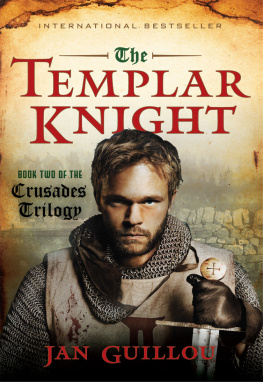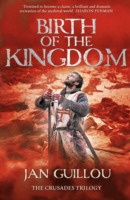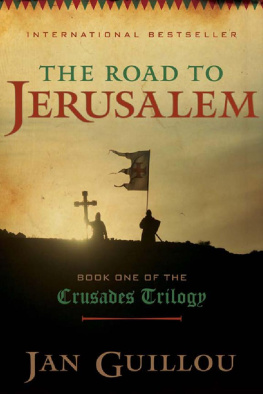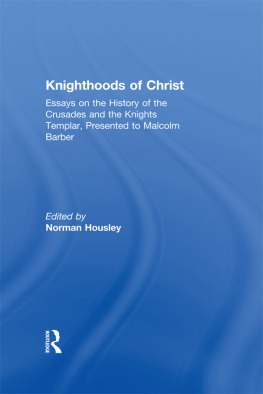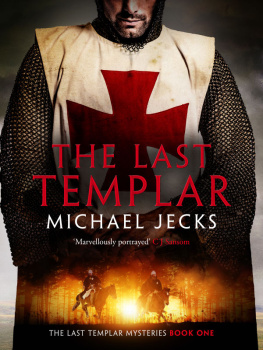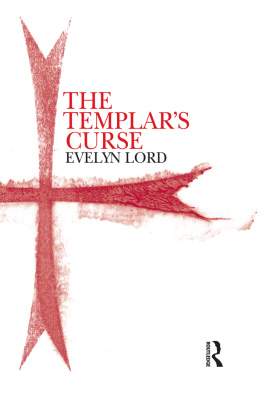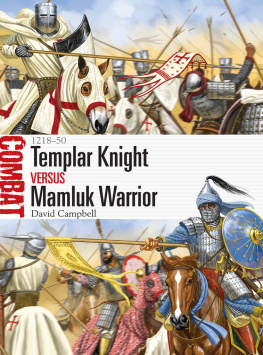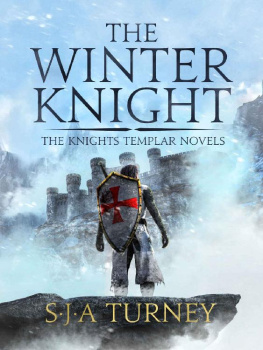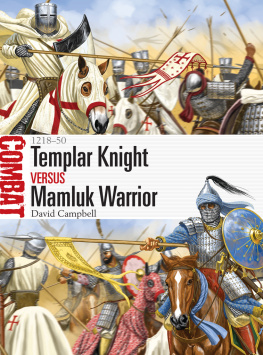Jan Guillou - The Templar Knight: Book Two of the Crusades Trilogy
Here you can read online Jan Guillou - The Templar Knight: Book Two of the Crusades Trilogy full text of the book (entire story) in english for free. Download pdf and epub, get meaning, cover and reviews about this ebook. year: 2010, publisher: Harper, genre: Art / Prose. Description of the work, (preface) as well as reviews are available. Best literature library LitArk.com created for fans of good reading and offers a wide selection of genres:
Romance novel
Science fiction
Adventure
Detective
Science
History
Home and family
Prose
Art
Politics
Computer
Non-fiction
Religion
Business
Children
Humor
Choose a favorite category and find really read worthwhile books. Enjoy immersion in the world of imagination, feel the emotions of the characters or learn something new for yourself, make an fascinating discovery.
- Book:The Templar Knight: Book Two of the Crusades Trilogy
- Author:
- Publisher:Harper
- Genre:
- Year:2010
- Rating:5 / 5
- Favourites:Add to favourites
- Your mark:
- 100
- 1
- 2
- 3
- 4
- 5
The Templar Knight: Book Two of the Crusades Trilogy: summary, description and annotation
We offer to read an annotation, description, summary or preface (depends on what the author of the book "The Templar Knight: Book Two of the Crusades Trilogy" wrote himself). If you haven't found the necessary information about the book — write in the comments, we will try to find it.
The Templar Knight: Book Two of the Crusades Trilogy — read online for free the complete book (whole text) full work
Below is the text of the book, divided by pages. System saving the place of the last page read, allows you to conveniently read the book "The Templar Knight: Book Two of the Crusades Trilogy" online for free, without having to search again every time where you left off. Put a bookmark, and you can go to the page where you finished reading at any time.
Font size:
Interval:
Bookmark:
In the name of God, most benevolent, ever-merciful.
God is great in His glory, Who took His votary in the night to a wide and open land from the Sacred Mosque to the most distant Mosque whose precincts We have blessed, in order to show him Our sign; Verily He is all-hearing and all-seeing.
The Holy Koran, Sura 17, Verse 1
KNIGHTS TEMPLAR
Al GhoutiArn de Gothia (Arn Magnusson)
Armand de Gascogne, his sergeant
Arnoldo de Torroja, Master of Jerusalem
Odo de Saint Armand, Grand Master
Siegfried de Turenne
Harald ysteinsson
Grand Master Roger des Moulins
CHRISTIANS
Count Raymond III de Tripoli
Reynald de Chtillon
Grard de Ridefort
King Baldwin IV
Baldwin dIbelin, later Baldwin V
Guy de Lusignan, later King Guy
Agnes de Courtenay
Father Louis
Heraclius
MUSLIMS
Yussuf ibn Ayyub Salah al-DinSaladin
Fahkr his brother
al Afdal, Saladins son
Ibrahim ibn Anaza
INHABITANTS OF GUDHEM CONVENT
Abbess Rikissa
Cecilia Algotsdotter (Rosa), betrothed of Arn
Cecilia Ulvsdotter (Blanca), betrothed of Knut Eriksson
Sister Leonore
Ulvhilde Emundsdotter
Fru Helena Stensdotter
FOLKUNG CLAN
Birger Brosa, Arns uncle
Magnus Mneskld, Arn and Cecilias son
Eskil Magnusson, Arns brother
King Knut Eriksson
Philippe Auguste, King of France
Richard the Lionheart, King of England
Friedrich Barbarossa, Emperor of Germany
During Muharram, the holy month of mourning, which occurred when the summer was at its hottest in the year 575 after Hijra, called Anno Domini 1177 by the infidels, God sent His most remarkable deliverance to those of His faithful He loved best.
Yussuf and his brother Fahkr were riding for their lives and right behind, shielding them from the enemies arrows, came the Emir, Moussa. Their pursuers, who were six in number, were steadily gaining on them, and Yussuf cursed his arrogance, which had made him believe that something like this would never happen since he and his companions possessed the swiftest of horses. But the landscape here in the valley of death and drought due west of the Dead Sea was just as inhospitably arid as it was rocky. This made it dangerous to ride too fast, although their pursuers seemed completely unhampered by this. But if one of them happened to take a spill, it would be no less fateful than if any of the men being chased should fall.
Yussuf suddenly decided to cut across to the west and head up toward the mountains, where he hoped to find cover. Before long the three pursued horsemen were following a wadi, a dry river-bed, up a steep slope. But the wadi began to narrow and deepen so that they were soon riding in a long ravine, as if God had caught them in flight and was now steering them in a specific direction. Now there was only one road, and it led upward, growing steeper and steeper, making it harder and harder to keep up their speed. And their pursuers were coming steadily closer; they would soon be within shooting range. The men being chased had already fastened their round iron-clad shields to their backs.
Yussuf was not in the habit of praying for his life. But now, as he was forced to decrease his speed more and more among all the treacherous boulders at the bottom of the wadi, a verse came to him from Gods Word, which he breathlessly rattled off with parched lips:
He who has created life and death in order to test you and allow you to prove who among you, by his actions, is the best. He is the Almighty. The One who always forgives.
And God did indeed test His beloved Yussuf and showed him, first as a mirage against the light of the setting sun, and then with terrible clarity the most horrific sight that any of the faithful in such a hunted and difficult situation could see.
From the opposite direction in the wadi came a Templar knight with lowered lance, and behind him rode his sergeant. Both of these foes were riding at such speed that their mantles billowed behind them like great dragon wings; they came like jinni out of the desert.
Yussuf abruptly reined in his horse and fumbled with his shield, which he now had to pull around to the front to face the infidels lance. He felt no fear, only a cold excitement at the nearness of death, and he steered his horse over to the steep wall of the wadi to present a narrower target and increase the angle of the enemys lance.
But then the Templar knight, who was only a few breaths away, raised his lance and waved his shield, as a signal to Yussuf and his brother to move aside and get out of their way. They complied at once, and the next moment the two Templar knights thundered past as they let their mantles fall, which fluttered to the dust behind them.
Yussuf quickly issued an order to his companions. With difficulty, their horses hooves slipping, they clambered up the steep slope of the wadi until they reached a spot from which they had a good view. There Yussuf turned his horse around and stopped, for he wished to understand what God meant by all of this.
The two others wanted to take advantage of the opportunity and escape while the Templar knights and bandits settled matters as they saw fit. But Yussuf rejected all such arguments with a curt gesture of annoyance because he truly wanted to see what would happen next. He had never in all his life been this close to a Templar knight, those demons of evil, and he felt strongly, as if Gods voice were advising him, that he had to see what was going to happen; mere common sense would not stop him. Common sense dictated that they should continue their ride toward Al Arish for as long as the light permitted. But what he now saw he would never forget.
The six bandits had few choices once they discovered that instead of chasing three wealthy men they were now facing two Templar knights, lance to lance. The wadi was much too narrow for them to be able to stop, turn around, and beat a retreat before the Franks were upon them. After a brief hesitation they did the only thing they could do: They grouped themselves so they were riding two by two and spurred their horses so as not to be killed by standing still.
The white-clad Templar knight who rode in front of his sergeant first feigned an attack to the right of the first two bandits, and when they held up their shields to counter the dreaded blow of his lanceYussuf wondered whether the bandits understood what now awaited themthe Templar knight spun his horse around with a swift movement that shouldnt have been possible in such tight quarters. This gave him a whole new vantage point, and he thrust his lance right between the shield and body of the bandit on the left. At the same time, he released his lance so as not to be wrenched out of his saddle. Just at that moment the sergeant came in contact with the astonished bandit on the right, who was huddled behind his shield, waiting for the blow that never came, and who now looked up only to see the other foes lance coming toward his face from the wrong direction.
The white-clad man with the loathsome red cross now faced the next two enemies in a passageway so narrow that there was barely room for three horses abreast. He had drawn his sword, and at first it looked as if he intended to attack head-on, which would have been unwise with a weapon on only one side. But suddenly he turned his handsome steed sideways, a roan at the height of its powers, and lashed out behind him, striking one of the bandits and toppling him out of the saddle.
The second bandit then saw a good opportunity since the enemy was approaching him sideways, almost backward, with his sword in the wrong hand and out of reach. What he did not notice was that the Templar knight had dropped his shield and switched his sword to his left hand. When the bandit leaned forward in the saddle to strike with his saber, he exposed his whole neck and head to the blow, which now came from the opposite direction.
Font size:
Interval:
Bookmark:
Similar books «The Templar Knight: Book Two of the Crusades Trilogy»
Look at similar books to The Templar Knight: Book Two of the Crusades Trilogy. We have selected literature similar in name and meaning in the hope of providing readers with more options to find new, interesting, not yet read works.
Discussion, reviews of the book The Templar Knight: Book Two of the Crusades Trilogy and just readers' own opinions. Leave your comments, write what you think about the work, its meaning or the main characters. Specify what exactly you liked and what you didn't like, and why you think so.

